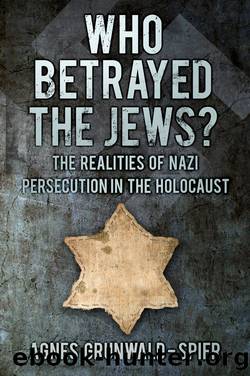Who Betrayed the Jews? by Agnes Grunwald-Spier

Author:Agnes Grunwald-Spier [Grunwald-Spier, Agnes]
Language: eng
Format: epub
ISBN: 9780750958011
Publisher: The History Press
Published: 2016-01-29T00:00:00+00:00
Berlin was a living architecture exhibition … After Weimar, Berlin was flourishing culturally. Walter Gropius, Ludwig Mies van der Rohe, and other modernists were looking for a peaceful and social world, and wished to express their ideas in architecture. I think the majority of Jewish architects chose to settle in Berlin to prove that anti-Semitism would no longer play a role in their lives.29
Simon Wiesenthal, who later became known as the ‘Nazi-Hunter’, was born in Lvov (which is now in the Ukraine) in 1908. As a young man he applied to the Polytechnic Institute in Lvov in 1928, but was not permitted entry because of restrictions on Jewish students. He therefore studied at the Technical University of Prague where, in 1932, he obtained a degree in architectural engineering and got a post in an architectural office in Lvov.30
Martin Punitzer (1889–1949) worked in the 1920s in Berlin. In the 1930s, he was persecuted by the Nazis as a Jew and had to emigrate to Chile.
In Budapest at the turn of the century, seventy of the city’s 110 architects were Jewish and they developed a distinct style with their identification with Hungarian nationalism.31 In Vienna, in the 1930s, there were many famous architects and 25–30 per cent were Jewish, according to Richard Bing (1909–2010). Bing was in Vienna in 1930 and he spoke of the blossoming of culture in the post-1918 world and mentioned Sigmund Freud, Oskar Kokoschka the painter, Bing’s lifelong friend the art historian, Sir Ernst Gombrich, and the composers Schoenberg and Alban Berg who created the Second Vienna School of the 1920s.32
Anna Sondhelm, a Hungarian survivor, said that both her grandfather and father were architects in Budapest. After her grandfather’s death, her father continued to practise and made a good living because ‘it was a booming regime between the two wars’.33
Anna’s family stayed put because they were protected as a result of war service (see page 416). She added that before 1944 her father had plenty of work, but:
Download
This site does not store any files on its server. We only index and link to content provided by other sites. Please contact the content providers to delete copyright contents if any and email us, we'll remove relevant links or contents immediately.
| Africa | Americas |
| Arctic & Antarctica | Asia |
| Australia & Oceania | Europe |
| Middle East | Russia |
| United States | World |
| Ancient Civilizations | Military |
| Historical Study & Educational Resources |
A Tale of Love and Darkness by Amos Oz(819)
Aimee & Jaguar by Erica Fischer(806)
When Time Stopped by Ariana Neumann(785)
The Hare with Amber Eyes by Edmund de Waal(762)
Remember Us by Martin Small(714)
The Betrayal of the Duchess by Maurice Samuels(702)
A Chosen Few by Mark Kurlansky(691)
Genius & Anxiety by Norman Lebrecht(672)
The Invention of the Jewish People by Shlomo Sand(638)
Roosevelt and the Holocaust by Robert L. Beir(595)
East West Street: On the Origins of "Genocide" and "Crimes Against Humanity by Philippe Sands(569)
Angel of Auschwitz by Tarra Light(563)
Nazi Germany and the Jews, Volume 01: The Years of Persecution by Saul Friedlander(560)
The Aleppo Codex: A True Story of Obsession, Faith, and the Pursuit of an Ancient Bible by Matti Friedman(547)
The Warburgs by Ron Chernow(544)
The Kosher Capones by Kraus Joe;(521)
Genius and Anxiety by Norman Lebrecht(486)
Odessa: Genius and Death in a City of Dreams by King Charles(485)
Complete Works of Josephus by Josephus(482)
